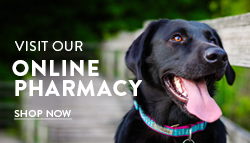Blog

Most dog owners, especially those with a puppy, get shivers down their spine when they hear the term parvo. This stands for parvovirus, a particularly contagious virus known to affect puppies. Unfortunately, it is one of the most common dog diseases with deadly consequences.
What Is Parvovirus?
This is a highly contagious virus that spreads via indirect contact with a contaminated object or direct contact with an infected dog. So every time your adorable pup consumes, licks, or even sniffs infected feces, they may develop this disease. You can also infect your puppy with parvovirus when you touch them after recently exposing yourself to an infected dog.
Indirect transmission may also happen when your little canine companion touches a contaminated object. This includes water or food bowl, leashes, collars, or even the clothing of people who handled an infected dog.
Why Is Parvo Dangerous?
This highly transmittable virus attacks the small intestines and stomach. This is where it does the most damage to a dog’s body. It often infects the small intestines and impairs absorption, destroys cells, and unsettles the gut barrier. In puppies, it can affect the lymphopoietic tissues and bone marrow, or even the heart.
Symptoms of Parvovirus in Puppies
Vaccines can prevent parvo. But when left untreated, it is extremely deadly. The mortality rate in untreated puppies is approximately 90 percent. Some of the common symptoms of parvovirus in puppies include:
- Fever.
- Bloody diarrhea.
- Rapid heartbeat.
- Vomiting.
- Lethargy.
- Low body temperature.
- Anorexia.
- Discomfort and pain.
- Inflamed, red tissue around the mouth and eyes.
- Severe weight loss.
- Dehydration and more.
Why Puppies Get Parvovirus
Puppies aged between six weeks to six months are most susceptible to this disease. That said, those aged less than six months can retain some of the antibodies their mother had, assuming that they received all their parvovirus shots. If you have a puppy, you need to know that puppies need parvo vaccinations at approximately six, eight, and 12 weeks of age.
Until they get all three parvovirus vaccinations in the series, they are more vulnerable to this deadly disease. This is why dog owners, especially those with puppies, need to take extra precautions to prevent their furry friends from getting this disease.
How to Prevent Parvovirus in Puppies
The American Veterinary Medical Association recommends vaccinations and good hygiene to prevent parvovirus. If you have a cute puppy friend, you need to ensure they get parvo vaccinations. Likewise, if you have an adult dog, you still need to keep up-to-date with their parvovirus vaccinations.
Early in life, puppies have immunity from their moms. However, they still need to receive their first vaccine between the ages of six and eight weeks. They also need to get two booster shots at about three-week intervals.
Until your puppy gets their complete series of shots, you should use extreme caution when taking them to places where other dogs and puppies congregate. This includes popular hiking trains, pet-friendly restaurants, dog parks, and even dog boarding facilities. You should also sequester your puppy until one month after their third shot, which is when they should achieve full immunity.
For more on preventing puppies from getting parvo, visit Bergen County Veterinary Center at our office in Waldwick, New Jersey. You can call 201-205-2500 today to schedule an appointment.






